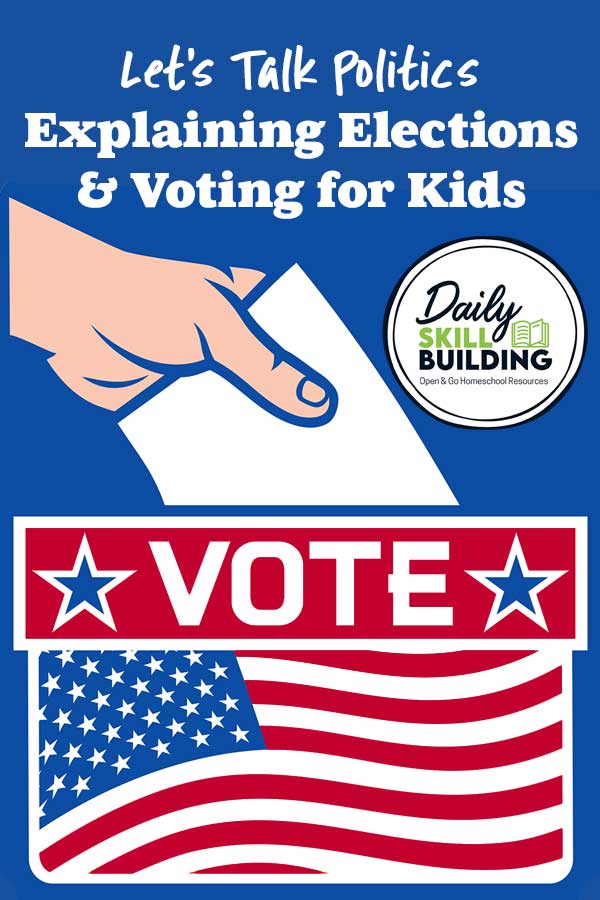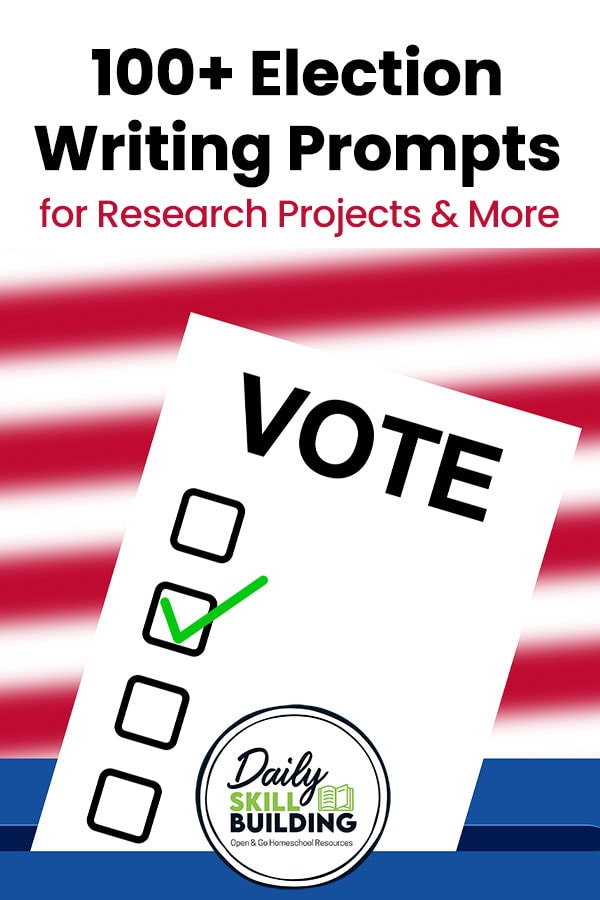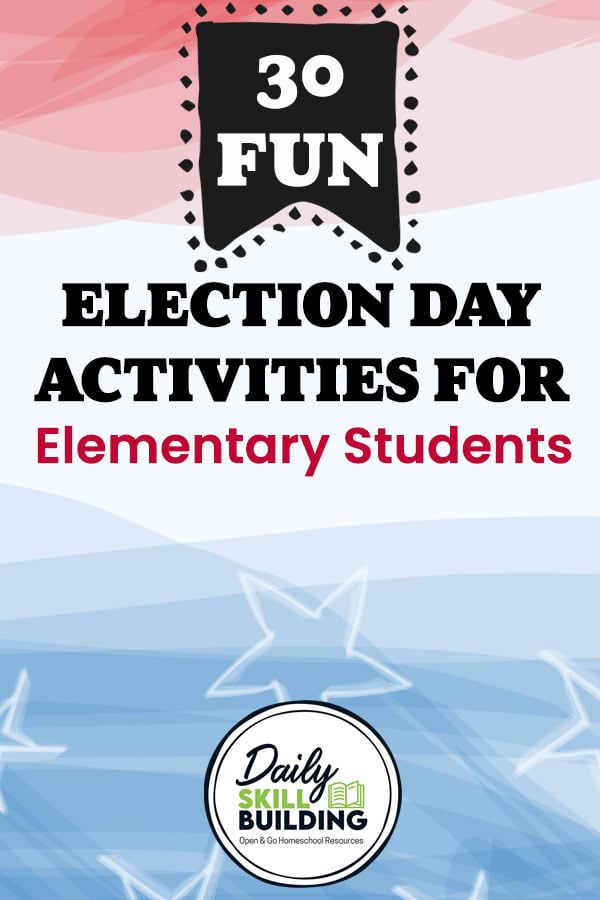Let’s explore a fascinating topic that often leaves both kids and adults scratching their heads: politics! We will take a look at the intriguing world of elections and voting for kids. Learn why voting matters and how it works in a way that helps your kids understand the U.S. election process.

Voting for Kids
Instilling the value of voting in kids at a young age can lead to lifelong voting habits. Educating children about the election process and the significance of voting early on sets the stage for their active participation in shaping the future of their communities and country.
By introducing them to the democratic process and the importance of their role in it, we lay the foundation for a society of engaged and responsible citizens.
What is Voting?
It’s like picking your favorite flavor of ice cream or deciding on a game to play with your friends. But when we vote, we are making decisions that help choose the leaders who make important rules and decisions for our community and country. It’s a way for all of us to have a say in what happens in our neighborhoods, schools, and cities.
Every vote is important because when we add them all up, they show what everyone wants, and that helps us make fair and important decisions together. So, your vote counts, and it’s a big part of how our democratic process works!
What is an Election?
An election is a special event where people get to choose who will be in charge of making important decisions for our community, such as our city, state, or even our country.
During an election, different candidates will try to convince us that they are the best person for the job. They will talk about what they believe in and what changes they want to make. It’s like trying to win a popularity contest by telling everyone how awesome you are.
The Election Process
Elections usually happen at polling places, which are special voting stations. We go there and fill out a ballot with our preferred candidate’s name on it. Sometimes it’s done using paper and pencil, but nowadays we can also use electronic voting machines.
Once all the votes have been collected, they are counted up to see which candidate got the most votes. The one with the most votes becomes the winner! It’s like winning a race where instead of running, candidates try to win over people’s hearts and minds.

20 Reasons It’s Important to Vote
Elections are important because they allow us to have a say in how things are run in our community. They give us the power to choose leaders who will listen to our ideas and make decisions that affect our lives. Here are 20 reasons why it’s important to vote:
Let’s Make Our Voices Heard
When we vote, we get to share our opinions and have a say in how our country is run. It’s an important way for us to express ourselves and make sure our voices are heard.
Choosing Our Leaders
By voting, we get to decide who will lead our country and make important decisions on our behalf. It’s like picking the captain of our team – someone we trust to make the right choices for all of us.
Protecting Our Rights
Voting helps protect the rights and freedoms that we enjoy as citizens. It ensures that everyone is treated fairly and has a chance to be heard.
Shaping the Future
When we vote, we have the power to shape the future of our country. We can support candidates who share our values and priorities, making sure that our hopes and dreams are represented.
Standing Up for What We Believe In
Voting gives us the opportunity to support causes and issues that are important to us. Whether it’s protecting the environment or fighting for education, our vote can make a difference.
Holding Leaders Accountable
By casting our vote, we can hold elected officials accountable for their actions and decisions. It’s like giving them a report card – if they’re not doing a good job, we can choose someone else next time.
Ensuring Representation
Voting ensures that different voices and perspectives are represented in our government. It’s important because everyone deserves to be heard, no matter where they come from or what they believe in.
Promoting Equality
Through voting, we can help promote equality by supporting policies that treat everyone fairly. We want to make sure that everyone has the same opportunities and rights.
Making a Difference
Each vote counts! Even just one vote can make a difference in deciding who wins an election. So don’t think your voice doesn’t matter – it does.
Honoring Those Who Fought for Our Rights
By voting, we honor the sacrifices of those who fought for our right to have a voice in the democratic process. We’re carrying on their legacy and making sure their efforts were not in vain.
Encouraging Civic Engagement
Voting encourages us to be active participants in our democracy. It’s like being part of a team – we all have a role to play and every contribution matters.
Influencing Policies
When we vote, we have a chance to influence policies on important things like education, healthcare, and the economy. Our vote can help shape the rules that affect all of us.
Strengthening Democracy
Voting is an essential part of keeping our democracy strong and alive. It’s like exercising a muscle – the more we do it, the stronger our democracy becomes.
Empowering Communities
By voting, we empower ourselves and our communities to create positive change. Together, we can make our neighborhoods and cities better places to live.
Addressing Local Issues
Local elections allow us to address issues directly impacting our neighborhoods and communities. We can choose leaders who understand our unique challenges and will work to make things better for us.
Supporting Good Governance
Voting helps ensure that qualified and responsible individuals are in positions of power. We want leaders who will make wise decisions and take care of our country.
Fostering Unity
By participating in elections, we come together as a community to work towards a common goal. We may have different opinions, but voting allows us to find common ground and move forward together.
Building Trust in the System
Voting builds trust in the democratic process and helps maintain faith in our government. When we see that our voices matter and that our votes count, it gives us confidence in how things are run.
Exercising Our Civic Duty
Above all, voting is our civic duty as responsible citizens to contribute to the functioning of our society. We have the power to make a difference and shape the future. So let’s use our power and make our voices heard!

History of Voting Rights
- 1776: The United States Declaration of Independence was adopted, which means that a group of people decided to make a special document. This document says that everyone is equal and has the right to life, freedom, and happiness.
- 1787: The U.S. Constitution was written, but it didn’t give voting rights to all citizens. Instead, it said that each state could decide who gets to vote.
- 1790: In 1790, they made a law that said only certain people can become citizens of the United States. These people have to be free, white, have good character, and live in the country for at least two years.
- 1820s-1840s: During these years, many states started changing their rules about voting. Before that, you had to own property to be able to vote. But now they got rid of that rule! This meant more white men could vote and have a say in how things are run.
- 1868: A really important amendment was added to the Constitution in 1868. It’s called the Fourteenth Amendment. This amendment says that if you are born or become a citizen of the United States, you have certain rights and protections under the law.
- 1870: Another important amendment came along in 1870 called the Fifteenth Amendment. This one says that no state can stop someone from voting just because of their race or if they used to be enslaved.
- Late 1800s-early 1900s: In some states out west during this time period, women were allowed to vote! But sadly, most women in other parts of the country still couldn’t vote yet.
- 1920: The Nineteenth Amendment was added to the Constitution, which gave women the right to vote all across the country. It was a big step towards equality!
- Mid-1900s: During this time, people started fighting against discrimination and unfair treatment of African Americans. They wanted equal rights for everyone, including the right to vote.
- 1965: In 1965, a really important law called the Voting Rights Act was passed. This law aimed to get rid of any unfair rules that were stopping African Americans from voting. They wanted to make sure that everyone’s voice could be heard.
- 1971: The voting age was lowered from twenty-one to eighteen for all federal elections. This change came about because many young people protested during the Vietnam War and wanted their voices to be heard too.
- 1990s-present: Even today, we are still working on making voting fair for everyone. People are trying to give back voting rights to those who made mistakes in the past and want a second chance. They are also trying to make it easier for people to vote by allowing mail-in ballots and early voting options
That’s a lot of history about voting rights! It’s important for us all to remember how hard people fought for these rights so that we can use our voices and make a difference in our country.
Getting Kids Involved in Elections
Engaging kids in the election process can be an interactive and educational experience. Here are several ways to involve children in understanding the voting process:
- Read Picture Books: Introduce children to the concept of elections through age-appropriate picture books that explain the voting process and the importance of civic participation. Engaging visuals and simple narratives can help them grasp the significance of elections.
- Discuss the Voting Process: Initiate family discussions about the voting process, explaining how it works, the significance of voting, and the impact it has on shaping communites and the country. Encouraging questions and providing clear explanations can enhance their understanding.
- Visit Polling Places: Take children to the polling place with you on Election Day, if feasible, to familiarize them with the physical locations where voting occurs. Observing the democratic process in action can make the concept more tangible and help them recognize the role of citizens in shaping government.
- Participate in a Mock Election: Organize a mock election at home or in a community setting where children can experience the process of voting firsthand. Providing them with the opportunity to cast their vote for a favorite candidate or issue can instill a sense of responsibility and civic engagement.
Do a Family Vote
Just like grown-ups vote for their leaders, families can also have their own mini-elections at home! It’s a fun way to make decisions together as a family.
To have a family vote, you need good communication within your family. That means talking and listening to each other respectfully. Family communication is super important because it helps everyone share their thoughts and ideas.
During a family vote, everyone gets a chance to express their opinions on different topics or choices. Remember, every voice counts! Then, you tally up the votes and see which option gets the most support.
Election Activities for Kids
Looking to engage your students in the election process?
These election writing prompts are perfect for developing critical thinking and research skills. The prompts at the beginning are ideal for upper elementary students, while the questions further down the page are simpler and suitable for younger students, allowing them to complete shorter assignments.
We’ve also included election research project ideas, essay prompts, and compare and contrast writing projects tailored for high school students.
Election Day Activities
With the election season approaching, it presents a wonderful opportunity to teach students about the democratic process in a fun and educational way.
By incorporating mock elections, election lessons, writing prompts, and election day activities for students, we can provide an immersive experience that fosters understanding and enthusiasm. These ideas are some of the best voting activities that will make learning about elections a memorable experience for your young learners.
Frequently Asked Questions about Voting for Kids
Voting for kids can be confusing; it’s even confusing for some adults! Here are som common questions kids wonder about voting:
Who is allowed to vote nowadays?
In the United States, adults who are U.S. citizens and meet certain requirements are allowed to vote nowadays. These requirements include being at least 18 years old, filling out voter registration timely, and being a resident of the state where they want to cast their vote.
Who can run for U.S. President?
To run for U.S. President, a person must be a natural-born citizen of the United States, at least 35 years old, and have lived in the country for at least 14 years. This means that not everyone can run for President, but those who meet these criteria have the opportunity to do so.
Where do you go to vote?
When it’s time to vote in a presidential election or any other election, we go to special places called polling places. These are usually located in nonprofit organizations such as schools, community centers, or other public buildings in our neighborhoods. They have ballot boxes where we can cast our votes.
What are political parties?
Political parties are groups of people who share similar ideas about how the government should work and what policies it should follow. In the United States, there are two main political parties: the Democratic Party and the Republican Party. Political parties help organize candidates and their supporters during elections.
How can kids show their support even though they cannot vote yet?
Even though young children cannot vote yet, they can still show their support for candidates in different ways! One way is by learning about the candidates and their ideas so they have a better understanding of what each candidate stands for. Kids can also talk with their parents or teachers about why they think certain candidates would make good leaders.
What are some other ways people can show support for their candidate?
There are many other ways that people can show support for their favorite candidate! Some examples include putting up election signs supporting the candidate around their neighborhood or putting bumper stickers on their cars. People can also volunteer to help the candidate’s campaign by making phone calls, distributing flyers, or even hosting events to raise awareness about the candidate.
Additionally, people can donate money to support their candidate’s campaign and attend rallies or public events where the candidate will be speaking. All of these actions help show support for a candidate and contribute to the excitement of the election season!
Final Thoughts
Remember, being involved in the political process is an important part of being a responsible citizen. It’s a great opportunity for us, as the next generation, to learn about our government and make our voices heard when we’re old enough to vote!




